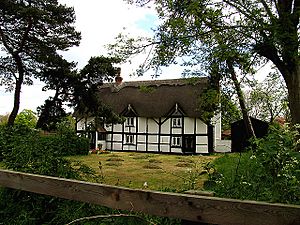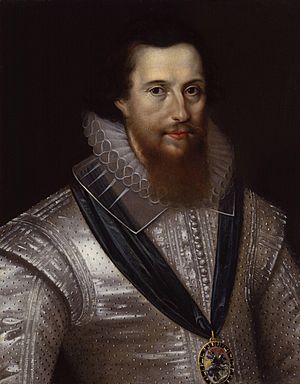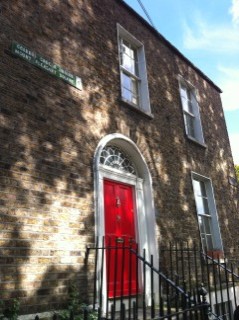Henry Docwra, 1st Baron Docwra of Culmore facts for kids
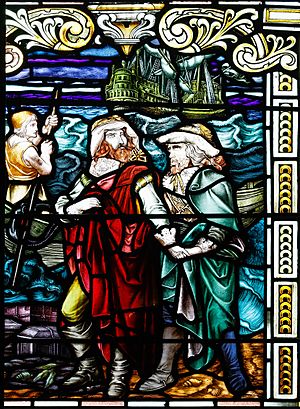
Henry Docwra, 1st Baron Docwra of Culmore (born 1564 – died 18 April 1631) was an important English soldier and leader in Ireland during the early 1600s. He is often called "the founder of Derry" because he helped establish the city.
Contents
Early Life and Family
Henry Docwra was born in 1564 at Chamberhouse Castle in Crookham, England. His family, the Docwras, were landowners who originally came from Yorkshire.
Henry was the only surviving son of Edmund Docwra, who was a Member of Parliament. His mother was Dorothy Golding. Henry's father faced money problems and had to sell their family home. This might be why Henry chose a career in the military.
The Docwra family did not have many powerful connections. This made things harder for Henry throughout his career, as family ties were very important back then. Henry did inherit some land in Berkshire, which he later sold to help him return to Ireland and public service.
Military Adventures
Henry Docwra started his career as a soldier in Europe, fighting in the Netherlands and France. He was still quite young when the English Crown sent him to Ireland around 1584.
He became the person in charge of Dungarvan Castle. In 1586, he served under Sir Richard Bingham, who was the governor of Connaught. They tried to bring peace to County Mayo but faced strong resistance from the Burke clan.
Serving with Important Leaders
Around 1590, Docwra left Ireland. Like many ambitious young men, he joined the service of the Earl of Essex, who was a favorite of Queen Elizabeth I. Docwra fought alongside Essex in the war against Spain.
He took part in the Siege of Rouen in 1591-1592. In 1596, he helped capture Cadiz, where Essex personally made him a knight for his bravery. The next year, he served under Sir Francis Vere in the Netherlands and fought well at the Battle of Turnhout.
Returning to Ireland
In 1599, Docwra was very happy to be sent back to Ireland. He served with Essex during the Nine Years War, acting as Essex's main military advisor. During Essex's difficult efforts to bring peace to Ireland, Docwra mostly worked to control the O'Byrne clan in County Wicklow.
Docwra did not take part in Essex's talks with Hugh O'Neill, the main Irish leader. These talks led to an agreement called the Cessation, which many saw as a surrender by the English. Queen Elizabeth I was very unhappy with Essex. Docwra returned to England with Essex in late 1599.
In 1600, Docwra was sent back to Ireland with an army of 4,000 men. He captured the ruined site of Derry in May 1600. Fighting continued until 1603.
Essex's agreement led to his downfall and later his rebellion against Queen Elizabeth I. He was executed in 1601. Docwra wisely stayed in Ireland during this time and was not suspected of being involved in Essex's plans. He quickly gained the trust of the new English leader in Ireland, Mountjoy.
Taking Control of Ulster
In April 1600, Docwra was given an army of 4,200 men to take control of Ulster. He landed at Carrickfergus and then went to Culmore. There, he built up the ruined castle and another fort nearby. He then moved to what is now Derry, fortifying the hill and planning the first streets of the new city. Further up the River Foyle, he fortified Dunnalong in July 1600.
He built strong, star-shaped forts with earthen walls and ditches at Culmore, Derry, and Dunnalong. He fought several small battles with the Irish, who reportedly admired his courage. He was badly wounded by Black Hugh O'Donnell. However, in his early months in Ulster, some in the English government thought he was too cautious, especially for keeping his men in Derry where many fell sick.
Docwra was very skilled at causing disagreements among the main Irish clans. He gained the support of several important Irish chiefs, including members of the O'Neill and O'Donnell families. His biggest success was getting Niall Garve O'Donnell, a cousin of Red Hugh O'Donnell, to support the English Crown for a while.
Some of Docwra's enemies accused him of being too trusting of the Irish chiefs. Docwra knew that these chiefs might not stay loyal if Spain attacked or if the English lost a major battle. But he believed their support was helpful as long as it lasted.
The winter of 1600-1601 involved more military trips and talks with the Irish. In 1602, he took Dungiven Castle from Donnell Ballagh O'Cahan, a key ally of Hugh O'Neill. This gave Docwra control of most of what is now County Londonderry and caused O'Cahan to switch sides, weakening O'Neill. Docwra joined forces with Mountjoy to finally defeat Hugh O'Neill, who surrendered in March 1603. The military campaign was very harsh, leading to the deaths of many Irish civilians.
When Queen Elizabeth I died, Docwra's strong actions prevented a rebellion in northern Ireland. His main Irish ally, Niall Garve O'Donnell, was angry because he was not made Earl of Tyrconnell. Docwra convinced Niall to trust in future rewards from the Crown. Docwra knew Niall's loyalty might not last, but he never fully trusted the Gaelic chiefs anyway.
The Founder of Derry
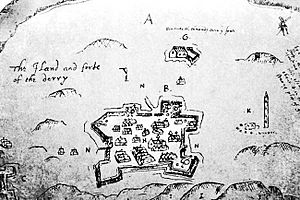
Docwra is known as "the founder of Derry" because he tried to develop it into a city. However, his early efforts didn't last, as the city was burned down in 1608.
Docwra hoped his service in the Nine Years' War would bring him great rewards, like becoming Lord President of Ulster. But he was never very popular, even with his own soldiers. His career was also hurt by disagreements with Sir Arthur Chichester, the powerful English leader in Ireland. Docwra also lacked powerful friends in the royal court, where he was sometimes seen as a nuisance. It was said that the Queen and her advisors dreaded receiving his long, angry letters whenever his actions were criticized. Despite his later military successes, some people still thought he was too cautious.
The old connection to Essex was also held against him, even though everyone agreed he had no part in Essex's rebellion. Sir Robert Cecil eventually decided to ignore Docwra's letters. Docwra felt personally insulted when a new Muster Master for Derry was appointed without his input. He argued fiercely with the first Master, Humphrey Covet, and even more so with his replacement.
Docwra had to be content with being appointed the first 'Governor of Londonderry and Culmore'. The city's first charter allowed him to hold markets and a fair. He was also responsible for appointing local officials like sheriffs and justices of the peace.
Docwra began to get tired of life in Ireland, though he didn't return to England until 1608. In 1606, Sir George Paulet bought him out of his public offices. Paulet's relationships with the Irish leaders of Ulster, especially Sir Cahir O'Doherty, were much worse than Docwra's.
During O'Doherty's uprising in 1608, O'Doherty's foster-father killed Paulet in battle, and Derry was burned. Docwra's policy of trying to make peace with the Irish nobles was now completely rejected. He was accused of not doing his duty and being too lenient towards the native Irish. He then retired to England in disgrace for a short time. After the Flight of the Earls and O'Doherty's rebellion, the English Crown no longer saw any benefit in working with the Ulster chiefs. Docwra's Irish allies were ruined, and many, like Donnell O'Cahan and Niall Garve O'Donnell, died as prisoners in the Tower of London.
Later Years
While retired in England, Docwra complained to King James I that he had been unfairly accused of being incompetent and that he hadn't been rewarded enough for his service. He especially complained about not being made Lord President of Ulster. In 1614, he published his Narrative, which described and defended his military actions in Ireland. This book is a valuable source of information from that time.
After ten years of trying, he finally returned to government work. In 1616, he became Treasurer of War for Ireland and moved back there. In 1621, he was given a noble title, becoming a peer, and received some land in Ranelagh and Donnybrook, which are now parts of Dublin.
Despite his title, Docwra was not a rich man. He didn't get the extra income that usually came with his job. He was promised more land, but it didn't happen until later. After he died, his colleagues praised him as "an honest man who died poor." As Treasurer, he didn't use his position to get rich, unlike many others at the time. In 1618, the English Council praised him for being careful and hardworking. His only real fault as Treasurer was that he was very slow in completing his accounts. In his last years, he found his job almost too much to handle.
Docwra died on 18 April 1631 in Dublin and was buried in Christ Church Cathedral, Dublin. His fellow Irish leaders sent a letter to their English colleagues, praising him as an "excellent civil servant" who died relatively poor. They asked them to take care of his widow and children.
Family Life
Henry Docwra married Anne Vaughan. They had two sons, Theodore and Henry, and three daughters, Anne, Frances, and Elizabeth. Theodore, the older son, inherited his father's title but died without children. He was living in poverty when he died in England in 1647. Since his brother Henry had died before him, the title ended.
Lady Docwra outlived her husband and both of her sons, living until 1648. She also faced poverty in her later years, even though she received some money from Richard Boyle, 1st Earl of Cork, who had been a close friend of her husband.
Docwra's Character
As a soldier, Docwra was brave, skilled, and tough. Even the Irish reportedly admired him as a "wise and careful knight, a pillar of battle." He was very good at negotiating with the Irish clans in Ulster and was known for causing arguments among them to help the English Crown.
Historians have noted that his enemies' accusations of being too "lenient" towards the Irish would have surprised the Irish themselves. Thousands of Irish people are said to have died because of his actions. As Treasurer of War, he had some critics, but he was also known for being hardworking, careful, and honest, even if he was slow.
In his personal life, he was seen as honest, dedicated to public service, and someone who thought for himself. For his time, he was considered quite tolerant in religious matters. While English troops under his command did kill some priests, his biographer believes Docwra did not order or approve these killings.
Images for kids
-
This map from around 1607 is one of the earliest pictures of Derry.
 | Charles R. Drew |
 | Benjamin Banneker |
 | Jane C. Wright |
 | Roger Arliner Young |


